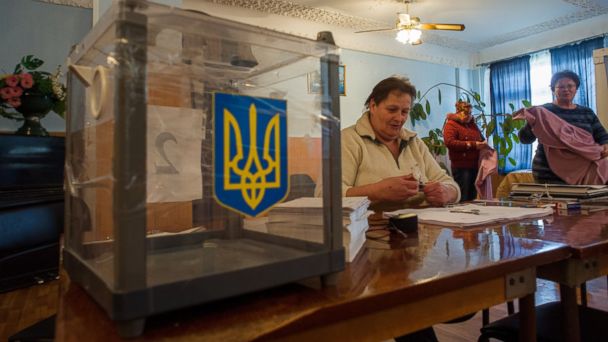What's at Stake in the Crimea Referendum and How Will US React?
On Sunday, the region of Crimea will hold a referendum on whether to declare its independence from Ukraine and ask to be absorbed by Russia. The region's leaders have suggested they might move quickly to join Russia after the vote, but the United States and its allies have warned of sanctions if that plan goes ahead.
What are they voting on?
There are two questions on the ballot.
The first asks: "Are you in favor of the reunification of Crimea with Russia as a part of the Russian Federation?"
The second asks: "Are you in favor of restoring the 1992 Constitution and the status of Crimea as a part of Ukraine?"
The second item may be a trick question, according to Reuters. Although it appears that the question asks if Crimea should remain part of Ukraine, the 1992 constitution afforded Crimea the rights of an independent entity within Ukraine.

(Andrew Lubimov/AP Photo)
Since ballots will be considered invalid if both or none of the boxes are checked, the only real options to voters are to join Russia or seek greater autonomy from Kiev.
"We know how the referendum will turn out on Sunday - a vote to join Russia," Steven Pifer, a former U.S. ambassador to Ukraine who is now with the Brookings Institution, told ABC News.
There have been rallies by supporters and opponents of joining Russia. Ethnic Tatars, who are 12 percent of the Crimean population, are staunchly opposed to joining Russia and have announced plans to boycott the referendum.
Why is Crimea so important?
The region is home to many ethnic Russians, but it is strategically important to Russia. Its Black Sea Fleet is based there, affording Russia's navy access to the Mediterranean Sea.
It is also important for the fledgling Ukrainian government in Kiev which wants to maintain the territorial integrity of Ukraine.
The United States and its allies also do not want Russian President Vladimir Putin to make a land grab in the region.
"Vladimir Putin has violated a major post-Cold War rule in Europe - respect for territorial integrity. If the West does not make clear there are consequences, will there be other cases?" Pifer asked.
The Kiev government, the Obama administration and its allies all insist the referendum is unconstitutional because it is not nationwide and violates international agreements.
Further afield, many worry Crimea voting for independence would set an example for other breakaway regions around the world, potentially escalating crises elsewhere.
What has Russia done so far?
The United States and the European Union have accused Russia of taking control of the peninsula with its own troops and auxiliary pro-Russian forces. Thousands of troops have flooded the region, taking over military bases (while surrounding others), the airports and other strategic locations. Though they wear no insignia, it is evident that they are Russian. Russia has also sent thousands more troops to its border with Ukraine and launched military drills.
There are also what appear to be freelance protesters from Russia - including some that have been described as intimidating thugs - that have swarmed into Crimea and Eastern Ukraine to protest loudly in favor of joining Russia and to menace those who oppose.
Russia also has launched a massive propaganda campaign. Russian media, controlled by the Kremlin, has flooded the airwaves with misleading reports of "fascists" taking over Ukraine and threats to ethnic Russians. Billboards erected ahead of the referendum offer the choice between Russia's flag and a Nazi flag.
What will Russia do after the vote? Invade? This is the big question. Will Russia push to annex Crimea or allow it to float in limbo?
"Annexation almost certainly would lead to a tough Western response, including financial sanctions," Pifer said. "Leaving Crimea in limbo, on the other hand, would create a bit of space for a dialogue that might defuse the crisis. Secretary of State John Kerry presumably spent much of his time with Foreign Minister Sergei Lavrov in London urging the limbo course. A lot depends on Mr. Putin's decision."
Lavrov said his country would decide what to do after the Sunday vote. He insisted his country has no plans to invade eastern Ukraine, which is mostly pro-Russian, but the Foreign Ministry issued a statement earlier in the day noting Russia's "responsibility" to protect Russian speakers and Russian passport holders in Ukraine. Analysts say this is a page directly out of Russia's 2008 playbook, when it used the same pretext to militarily support breakaway regions in Georgia.
What will the U.S. and its allies do in response?
The Obama administration has threatened sanctions if Russia does not "de-escalate" the situation. Some penalties - including visa bans and asset freezes - could come as early as Monday just for holding the referendum.
Exactly what those penalties entail will depend on what happens on Sunday. The White House and the European Union have warned of more sanctions on individuals and even include financial institutions if Russia perseveres.
"If the crisis spins further out of control, we'll get pulled into it in any case," Pifer said. "We might as well engage now and try to contain the damage."
Europe is starting to get on board with sanctions as well. It has much more trade with Russia, so sanctions from Europe would bite. But much of Europe, particularly Germany and the Netherlands, are dependent on Russia for large percentages of their energy and are worried about retaliation from the Kremlin.